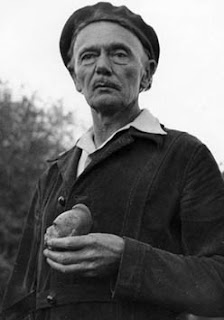Your questions touch on problems that are, I think, vastly more difficult to elucidate than you imagine. The ultimate motivations of any man’s life, philosophy, art, likes, dislikes, etc., are probably more obscure than is realized; and I doubt if modern psychology has approached them. For this reason, I am not sure that I understand myself, or that any human being can understand himself or others. And understanding is even harder to communicate than achieve, since words may, and usually do have, extremely divergent values for different minds. Having delivered myself of this warning, I’ll try to answer some of your questions.
To the best of my belief, the style in which I write is a perfectly natural mode of utterance for me, and is not affected. My approach to literature is primarily artistic, poetic, esthetic, and for this reason I like the full-hued and somewhat rhythmic type of prose. For many years, I wrote only verse (I have published three volumes of it); and I have always had a prejudice in favor of what is called “the grand manner.” I have also made many paintings and drawings, of a fantastic type; and this pictorial trend has probably influenced my story-writing too. Perhaps, in some case, it has led me to an overuse of adjectives in the effort to achieve a full and vivid vizualization, or rendering of atmosphere.
My stories spring from a profound liking for the imaginative and fantastic, together with a deep speculative interest regarding the cosmic mysteries, and the actual possibilities of other inhabited worlds and alien modes of being. I suspect that nothing any of us can imagine is half so fantastic as the truth of what may exist outside the human aquarium! Together with my interest in the cosmic, I have (without definitely believing in the supernatural) a vast curiosity concerning what may lie behind the veils of the material world. Life, as I see it, is surrounded and permeated by insoluble mysteries; and I strongly suspect that it is influenced by many forces that science has not yet been able to detect. Perhaps this will help you to understand the mental background of my tales.
As to what life means to me, I think I can safely say that it is largely synonymous with work. I am trying to establish myself as a professional story-writer, and to earn, if possible, enough money so that I will ultimately be able to devote part of the time to the poetry and painting which I have been forced to lay aside through financial exigency. I consider myself fortunate to write (and enjoy writing) a type of fiction that appeals to any considerable portion of the public.
My letter in S[trange] T[ales] touched on a many-sided problem, and I suppose any pronouncement as to what is the highest or most important element in a story is, after all, a matter of personal preference. Your point as to a mingling or co-relating of human and unhuman elements in a horror tale is well-taken, and I agree with you that Poe has obtained some magnificent effects by such opposition. The convincing evocation of macrocosmic or “outside” elements is, I think, far rarer than the adequate presentment of the human, and seems to require a greater capacity for imaginative projection, so for this reason I was tempted to put it higher. But it all depends on what you want, I suppose. It is obvious that the widest public appeal in a story must be based largely on common emotions. Genuine appreciation of the ultrahumanly fantastic presupposes a certain capacity for detachment from the everyday interests and feelings of life. There has to be, temporarily, an objectifying interest, a transcending of the material concerns of the species. The emotion evoked by work of this sort is largely esthetic—a delight in ideas. images, style, etc., for their own sake, rather than a rudimentary solar-plexus tickling. Fantasy represents the effort of the human mind to go beyond the rather painful limits of experiences and observation, it is, so to speak, an aspiration toward the unknown infinities. It corresponds in the world of art and intellection, one might say, to what mysticism is in the spiritual world—an effort toward a broader consciousness than that achieved through the relativities of mundane existence.
From all this, you must not infer that I am indifferent to work that deals with the actual happenings and possibilities of life. The thing that I deprecate is the sort of modern realism, or, more properly, literalism, which treats such happenings and possibilities as a closed microcosm, thoroughly known and charted, and sealed against the unknown elements of the macrocosm. This type of stuff I have come to regard as thoroughly sterile and limitary. It is not, as I see it, a true realism at all, The most elementary facing of the facts of our position in the unverse should include an acceptance of myriad unknown potentialities. Any day, forces may be stumbled upon by investigative scientists that will give an entirely new value and bearing to observed data, and invalidate the whole kit and kaboodle of accepted theories.
I hope that this will make my standpoint, and my stories, clearer to you.*
Smith’s letter to Strange Tales was printed in the January 1933 issue under the title “The Tale of Macrocosmic Horror.” It is reprinted in Planets and Dimension: Collected Essays of Clark Ashton Smith (1973), edited by Charles K. Wolfe, pp. 18-19.
*"Clark Ashton Smith letter to Richard Dodson 1932-11-10", Richard W. Dodson Collection of Science Fiction, Digital Initiatives, University of Idaho

No comments:
Post a Comment